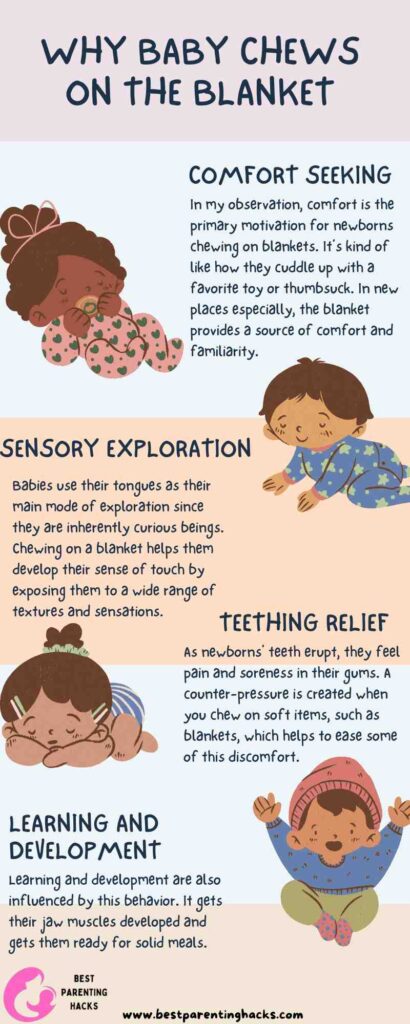Table of Contents
As a mom, I frequently find myself in awe of the tiny peculiarities and routines that my child creates. One habit that particularly stood out to me was the first time I saw my child chewing on their blanket. At first, it appeared to be a sweet, innocent gesture, but the more I saw it, the more I wondered why. This activity involves a complicated fusion of developmental stages and sensory investigation; it is not merely a random deed. I’ve learned from my experience and talks with other parents that newborns frequently experience this. But why do they act in this way? Is this behavior temporary, or is there more to it?
The obvious response to the headline question, “Why My Baby Chews on the Blanket?” is found in the complex process of a baby’s development. For warmth, sensory exploration, and teething relief, babies gnaw on blankets. Using their senses to comprehend the world around them is a normal component of their growing process. Particularly in unfamiliar or stressful circumstances, chewing on a soft, comfortable object like a blanket gives one a sense of security and comfort. Furthermore, I’ve seen as a parent that this tendency peaks around my baby’s teething phase, suggesting that it’s also a means of relieving their painful gums.

Understanding the Behavior: Why Baby Chews on the Blanket
Investigating the developmental elements of a baby’s first year of life is necessary to understand why newborns chew on blankets. Babies are learning a lot about their surroundings at this time, and one of the main ways they accomplish this is by using their mouths. They may investigate flavors, textures, and feelings by chewing or mouthing items, which is important for their sensory development. Observing my infant, I saw that every bite seemed to be an investigation, a means of getting a feel for the blanket’s warmth, texture, and softness.
1. Comfort Seeking: In my observation, comfort is the primary motivation for newborns chewing on blankets. It’s kind of like how they cuddle up with a favorite toy or thumbsuck. In new places especially, the blanket provides a source of comfort and familiarity.
2. Sensory Exploration: Babies use their tongues as their main mode of exploration since they are inherently curious beings. Chewing on a blanket helps them develop their sense of touch by exposing them to a wide range of textures and sensations.
3. Teething Relief: As newborns’ teeth erupt, they feel pain and soreness in their gums. A counter-pressure is created when you chew on soft items, such as blankets, which helps to ease some of this discomfort.
4. Learning and Development: Learning and development are also influenced by this behavior. It gets their jaw muscles developed and gets them ready for solid meals.
You Might Also Like to Read: I Accidentally Gave My Baby Expired Baby Food. What Should I Do?
Potential Concerns
I became aware of possible issues with this activity while watching my infant chew on their blanket. It is vital to achieve a balance between safety and health awareness and an appreciation of this typical developmental time.
1. Choking Hazard: The possibility of choking is the main worry. Small bits of cloth or loose threads from the blanket can be quite dangerous.
2. Hygiene Issues: When blankets are chewed on repeatedly, they might harbor bacteria and germs. Infections or diseases might result from this.
3. Over-dependence on the Blanket: Another worry is that the infant may grow too reliant on the blanket for comfort, which might be difficult to handle in the future.
4. Impact on Dental Health: Chewing on blankets for extended periods may hurt dental health, especially if the behavior persists as the infant gets older.
5. Interference with Exploration: A baby’s exploration of different textures and objects, which is crucial for their general sensory development, may be impeded by excessive chewing on a blanket.
You Might Also Like to Read: Is 50 Degrees Too Cold For My Baby?

Mitigating the Habit
As a parent, I’ve discovered that it’s critical to both comprehend and embrace this behavior as well as properly control it.
1. Offer Safe Alternatives: You may distract your infant from the blanket by offering safe, age-appropriate teething toys.
2. Encourage Other Comforting Activities: By offering alternative soothing activities, such as soft rocking or hugging, you may help the baby become less dependent on the blanket.
3. Maintain Hygiene: To ensure proper hygiene, wash the blanket and any other chewing items regularly.
4. Supervise Closely: To reduce potential safety hazards, keep a close eye on your child at all times when they are using their blanket, especially whether they are sleeping or playing.
5. Gradual Weaning: You may gently wean your kid off of this habit by gradually restricting their access to the blanket and introducing them to other types of comfort.

Parental Insights and Tips
I’ve gained some knowledge and advice from interacting with other parents and from my own parenting experience that may be useful.
1. Patience is Key: It’s important to recognize that this is a phase and to exercise patience. Since each infant is unique, they will eventually outgrow this tendency.
2. Stay Informed: Being aware of your baby’s growth phases can help you better understand and control their actions.
3. Community Support: Talking with other parents in forums and through conversations can yield insightful information and helpful advice.
4. Consult Professionals When Necessary: It’s usually a good idea to speak with a physician or child development expert if you have any questions or concerns regarding your baby’s behavior.

Conclusion
To summarize, understanding why neonates chew on blankets requires considering both their safety and well-being, as well as their developmental needs. I’ve discovered as a parent that this behavior is a normal aspect of their development and learning. It all comes down to giving children a secure and supportive atmosphere in which kids may develop, learn, and explore. Managing this behavior necessitates establishing a balance between supervision, providing alternatives, and maintaining hygiene. Remember that every baby is special and, as parents, our role is to evolve gain knowledge, and adjust ourselves as we accompany them on their journey.
FAQs
1. Is chewing on blankets by newborns normal?
Indeed, that’s a typical stage in their growth. They can explore, find solace, and get rid of the pain associated with teething.
2. When my baby chews on their blanket, how can I make sure they’re safe?
Keep an eye on your child at all times, make sure the blanket is clean and free of loose threads, and maintain its condition.
3. What are other teething treatment options besides chewing on a blanket?
Soft, chewable toys, cold washcloths, and teething rings can all be excellent substitutes.
4. Do I need to worry about my hygiene?
Yes, to stop the transmission of germs, it’s crucial to keep the blanket and any other chewable items clean.
5. When should I bring this conduct up with a pediatrician?
See a pediatrician if the behavior appears out of control or if you have any worries about your baby’s growth or well-being.
6. Will this behavior impact the emergence of my baby’s teeth?
Although this practice is often not harmful to the development of teeth, it is nonetheless advisable to monitor and control it.




